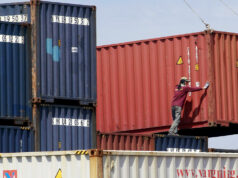European bank eyeing foray into local market
By Melissa Luz T. Lopez, Senior Reporter
A EUROPEAN BANK has expressed interest to venture into the Philippines, a senior central bank official said, amid growing interest among foreign lenders to set up shop here.
Bangko Sentral ng Pilipinas (BSP) Deputy Governor Chuchi G. Fonacier said a Europe-based bank expressed intent to foray into the local scene last January.
“During the Bankers’ Night, an official approached me to say they are interested in applying for a license,” Ms. Fonacier told reporters on the sidelines of a financial education program yesterday.
“They did not say if it’s a branch or subsidiary, but they said their interest to apply.”
Ms. Fonacier did not disclose further details about the foreign bank pending the filing of actual applications with the regulator.
Republic Act 10641 signed by then-President Benigno S.C. Aquino III lifted the limit that allowed only 10 foreign-owned banks to operate in the Philippines at any given time. Since its passage in 2014, 12 foreign lenders have secured the central bank’s approval to set up their branches here.
If ever, this European lender will be the first non-Asian bank to enter the Philippines in recent years, as all the new entrants came from neighboring countries in the region.
Five Taiwanese banks have opened branches in the Philippines over the last three years: Cathay United Bank, Yuanta Commercial Bank Co. Ltd., First Commercial Bank, Hua Nan Commercial Bank Ltd., and the Chang Hwa Commercial Bank, Ltd.
South Korean lenders Industrial Bank of Korea, Shinhan Bank, and Woori Bank also started their businesses here, as well as the Japan-based Sumitomo Mitsui Banking Corp. and the Singapore-based United Overseas Bank Ltd.
The newer players are the Industrial and Commercial Bank of China Ltd. and Malaysia’s CIMB Bank.
Other European banks with branches or offices in Manila are Deutsche Bank AG, ING Bank N.V., Standard Chartered Bank, the Hong Kong & Shanghai Banking Corp., BNP Paribas, Credit Suisse AG, and UBS AG.
INCLUSION
Also yesterday, the BSP unveiled a new financial literacy program targeting overseas Filipino workers (OFWs) to encourage them to save regularly and invest in legitimate products.
The central bank inked an agreement with the Overseas Workers Welfare Administration and BDO Foundation for the Pinansyal na Talino at Kaalaman (PiTaKa) campaign, which entails the production and display of informative videos and materials on how to better manage remittances, get out of debt, and set aside savings.
The PiTaKa drive will involve the screening of videos during the pre-departure and post-arrival seminars required for OFWs, alongside a separate training guide for their families.
There are over 10 million OFWs, but only some 35.5% set aside a portion of remittances as savings. An even smaller share at 5.1% said they invest the money sent home by their relatives working abroad.
Cash remittances reached a new all-time high of $28.943 billion in 2018, 3.1% higher than a year ago. This supported domestic household spending and accounted for a tenth of gross domestic product.
Ms. Fonacier said that increased OFW savings and investments would “help the economy,” as it would mean that their hard-earned money will support other causes apart from the purchase of food and consumer goods.



